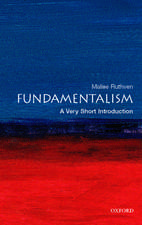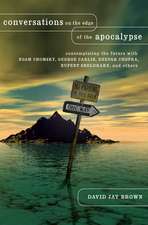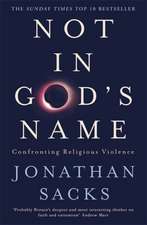Revive Us Again: The Reawakening of American Fundamentalism
Autor Joel A. Carpenteren Limba Engleză Paperback – 29 iul 1999
Preț: 132.39 lei
Nou
Puncte Express: 199
Preț estimativ în valută:
25.33€ • 27.60$ • 21.35£
25.33€ • 27.60$ • 21.35£
Carte tipărită la comandă
Livrare economică 12-18 aprilie
Preluare comenzi: 021 569.72.76
Specificații
ISBN-13: 9780195129076
ISBN-10: 0195129075
Pagini: 368
Ilustrații: 20 halftones
Dimensiuni: 155 x 231 x 23 mm
Greutate: 0.58 kg
Editura: Oxford University Press
Colecția OUP USA
Locul publicării:New York, United States
ISBN-10: 0195129075
Pagini: 368
Ilustrații: 20 halftones
Dimensiuni: 155 x 231 x 23 mm
Greutate: 0.58 kg
Editura: Oxford University Press
Colecția OUP USA
Locul publicării:New York, United States
Recenzii
Carpenter's ... narrative is historically weighty but journalistically clear, and vividly recreates the world of the conservatives in the 1930s and 1940s.
Carpenters story, like his prose, is vivid and compelling. His presentation of an era of complicated loyalties shows true sympathy for his subjects on both sides of their divisions. His book is to be commended as an outstanding and monumental example of sympathetically evangelical scholarship.
"This is crucial book for understanding how fundamentalism built a vital counter-culture during the 1930s and 1940s. Their efforts provided the base for the emergence of the broader evangelicalism of the Billy Graham era and for later fundamentalism. Carpernter is the leading authority on this subject and does a superb job in depicting it."--George Marsden, Francis A. McAnaney Professor of History, University of Notre Dame, and author ofThe Outrageous Idea of Christian Scholarship
"Carpenter's work easily ranks as the premier analysis of American Fundamentalism from the 1920s to the rise of Billy Graham in the 1950s. He weaves theological, cultural, and social strands into a mosaic that is as sweeping in its breadth as it is beautiful in its telling. Sit back and watch a master artist at work."--Grant Wacker, The Divinity School, Duke University
"In this groundbreaking new book, historian Carpenter...argues that fundamentalists did not vanish in the 1930s and `40s--they went underground and built a unique and powerful subculture, with Bible schools, foreign mission societies, seminaries, camp meetings, and mom-and-pop publishing houses.... A valuable contribution to a critical but neglected era in fundamentalist studies."--Kirkus Reviews
"Carpenter's portrait of the lost years of American fundamentalism is compelling religious and cultural history."--Publisher's Weekly
"This is an important book, bristling with insights. ...Carpenter's book is one of the best we have on fundamentalism. He reminds us that, while it is tempting to vilify fundamentalists, they represent a genuine religious tradition whose staying power and influence demand serious attention."--Bruce Hindamarsh, Books & Culture
"Carpenter's book is a carefully researched study of why and how fundamentalist Christians have been able to prove earlier notices of their movement's demise to have been greatly exaggerated."--The Chicago Tribune
"Indispensable....Whether he is sketching some of the dominant figures of the fundamentalist movement, exploring the fruitful tension between the need to be separated from the world and the imperative to evangelize, or recounting the amazing saga of fundamentalism via radio...Carpenter is comprehensive without ever becoming pedantic."--John Wilson, Christianity Today
"A lucid, in-depth account of the creation of an institutional counter-culture for fundamentalism between the 1920s...and the rise of Billy Graham in the 1950s."--David Martin, Times Literary Supplement
"Carpenter has successfully combined institutional, intellectual, and cultural history to write the definitive account of the 'lost years' of American fundamentalism."--Los Angeles Times Book Review
"This is a helpful study of fundamentalism in the 1930s and 40s, which contributes to our understanding of the emergence of contemporary evangelicalism. The tensions withinthis religious outlook are clearly delineated. The book combines attention to specifics with a clear interpretive framework."--Darrell Jodock, Muhlenberg College
Carpenters story, like his prose, is vivid and compelling. His presentation of an era of complicated loyalties shows true sympathy for his subjects on both sides of their divisions. His book is to be commended as an outstanding and monumental example of sympathetically evangelical scholarship.
"This is crucial book for understanding how fundamentalism built a vital counter-culture during the 1930s and 1940s. Their efforts provided the base for the emergence of the broader evangelicalism of the Billy Graham era and for later fundamentalism. Carpernter is the leading authority on this subject and does a superb job in depicting it."--George Marsden, Francis A. McAnaney Professor of History, University of Notre Dame, and author ofThe Outrageous Idea of Christian Scholarship
"Carpenter's work easily ranks as the premier analysis of American Fundamentalism from the 1920s to the rise of Billy Graham in the 1950s. He weaves theological, cultural, and social strands into a mosaic that is as sweeping in its breadth as it is beautiful in its telling. Sit back and watch a master artist at work."--Grant Wacker, The Divinity School, Duke University
"In this groundbreaking new book, historian Carpenter...argues that fundamentalists did not vanish in the 1930s and `40s--they went underground and built a unique and powerful subculture, with Bible schools, foreign mission societies, seminaries, camp meetings, and mom-and-pop publishing houses.... A valuable contribution to a critical but neglected era in fundamentalist studies."--Kirkus Reviews
"Carpenter's portrait of the lost years of American fundamentalism is compelling religious and cultural history."--Publisher's Weekly
"This is an important book, bristling with insights. ...Carpenter's book is one of the best we have on fundamentalism. He reminds us that, while it is tempting to vilify fundamentalists, they represent a genuine religious tradition whose staying power and influence demand serious attention."--Bruce Hindamarsh, Books & Culture
"Carpenter's book is a carefully researched study of why and how fundamentalist Christians have been able to prove earlier notices of their movement's demise to have been greatly exaggerated."--The Chicago Tribune
"Indispensable....Whether he is sketching some of the dominant figures of the fundamentalist movement, exploring the fruitful tension between the need to be separated from the world and the imperative to evangelize, or recounting the amazing saga of fundamentalism via radio...Carpenter is comprehensive without ever becoming pedantic."--John Wilson, Christianity Today
"A lucid, in-depth account of the creation of an institutional counter-culture for fundamentalism between the 1920s...and the rise of Billy Graham in the 1950s."--David Martin, Times Literary Supplement
"Carpenter has successfully combined institutional, intellectual, and cultural history to write the definitive account of the 'lost years' of American fundamentalism."--Los Angeles Times Book Review
"This is a helpful study of fundamentalism in the 1930s and 40s, which contributes to our understanding of the emergence of contemporary evangelicalism. The tensions withinthis religious outlook are clearly delineated. The book combines attention to specifics with a clear interpretive framework."--Darrell Jodock, Muhlenberg College
Notă biografică
Joel A. Carpenter is Provost of Calvin College, in Grand Rapids, Michigan. He has also been the Director of the Institute for the Study of American Evangelicals at Wheaton College as well as Director of the Religion Program of The Pew Charitable Trusts in Philadelphia.














